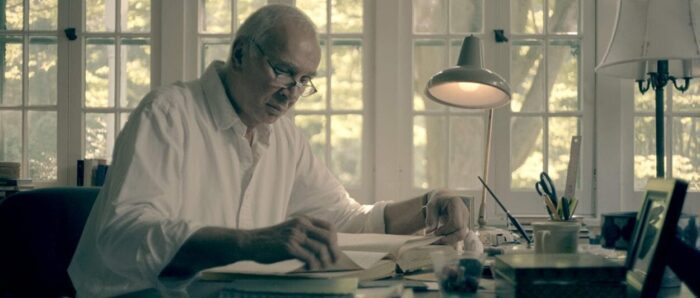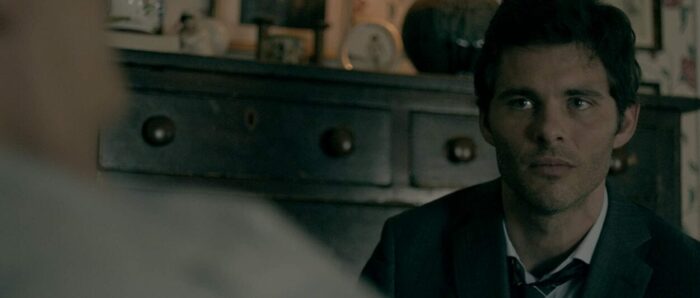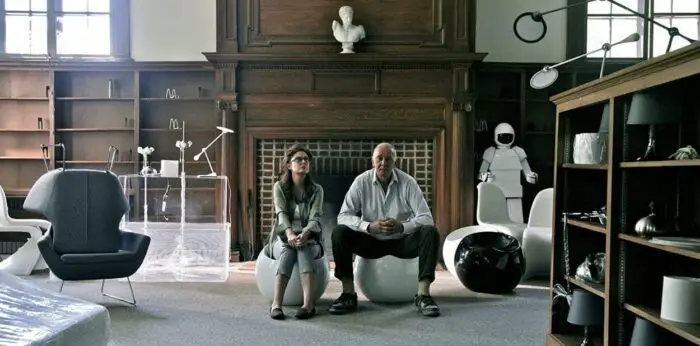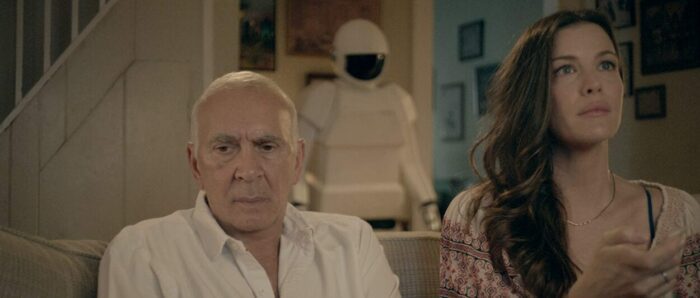When I watched Robot & Frank starring Frank Langella, set in the “near future,” I couldn’t help but picture myself as the main character, a man in his 70s. The story takes place in a plausible 21st century future where robots have become common. There’s a good chance that, when that day comes, I’d likely be his character’s age and be just as resistant to new technology as he is (a mindset I already readily feel at 40). In small moments, Langella even talks like a late-Generation X-er, letting out a few “cools” to respond to people. Also, unlike lofty and foreboding Isaac Asimov or Philip K. Dick science fiction, the robots in this film’s setting are not a societal threat or new class of beings. There are just another appliance or device that we humans bring into our homes.
Every youthful and current generation constantly questions why their elders and senior citizens are resistant to change and technology. They ask “why can’t they just get it?” when they hand a seemingly simple and improved device to an old person. The young people making those remarks forget two things with that biased complaint.

The first is that those senior citizens being dismissed and berated now used to be as young as them at one point in their lives and were, in their day, the “whippersnappers” of youthful dissent and trendy knowledge. They have already been where you are. The second thing is that the young people forget that they will become the old, non-conforming, and out-of-touch person they see before them. As ignorant youth, they don’t see their own mortality and evolution.
With that in mind, Robot & Frank is, on many levels, about an older person who is resistant to change allowing to the change to come into his life. It’s also about finding companionship in unlikely places. Robot & Frank is a very good movie with more to say than you think. It’s more than its trailer of curmudgeonly old man bad-mouthing the changes of the present. This movie might just sneak up on you and have you reaching for tissues before the credits role.
Frank Langella, an Academy Award nominee for playing President Richard Nixon in Ron Howard’s Frost/Nixon, plays Frank Weld, a retired former cat burglar who still very much feels his old lifestyle, despite his advanced age. The likeliest reason for that is his increasing dementia and mental deterioration. He lives alone in upstate New York and is periodically visited by his two grown kids. His son Hunter (the reliable James Marsden) is a successful straight-arrow businessman and family man who, full of guilty responsibility and pity, carves the time to come every weekend to tidy up his father and the house. His daughter Madison (Liv Tyler) pretty much only visits via video chat from philanthropic missions as a peace worker in Asia.

Between those visits, he is alone and lazy. The one thing he perks up for is walking into town and picking up books at the local library. While the library is slowly being phased out for digital media over print media, he carries on a flirty crush on the librarian Jennifer (a fetching Susan Sarandon).
You’re never too old for a crush. No matter what age you are watching Robot & Frank, you will understand and love Frank’s flirtation and crush on Jennifer. Like Jack Lemmon and Walter Matthau before Langella in their Grumpy Old Men series, we’ve seen old crushes before and have learned that you’re never too old to find love again.

Frustrated with the time away from his own family and his father’s failing initiative, Hunter purchases a health care robot (voiced by Peter Saarsgard) to look after Frank. The robot, looking a bit like a segmented life-size LEGO figure (designed by Lilo Tauvao and played under the shell by Rachel Ma), is programmed to get Frank on a daily routine, manage the house like a butler (cooking and cleaning), and improve his mental function through cognitively enriching activities like gardening.
A mixed bag comes from older generations matched with technology. I do believe both ideas laid out before: that the old were once as young and tech-savvy for their time as the present youth are today and that the youth of today will someday be in their position. For some older people, it’s not that they are not smart enough to accept new technology. They’re just not willing to invest their limited time in it or don’t see it as a significant difference or need. If many of us were Frank’s age, we wouldn’t want a meddlesome robot either at first.
Frank initially dislikes the robot and its programmed purpose, but realizes a few winning qualities. The robot is somebody he can talk to and even talk down to. Next, the robot isn’t programmed with any morality, making itself an easy sell and quick study to learning Frank’s old skills of planning a heist, picking locks, and breaking and entering. In cooking up a new heist, Frank gets a useful partner in crime and the robot gets Frank involved in a cognitively enriching activity. The robot doesn’t see the wrong in it and Frank gets a little boost in purpose and confidence.
Naturally, things can’t stay in that direction. Frank’s age is going to catch up with him. He’s not the spry thief he used to be. His kids are going to worry and impose, and Frank may make the wrong steps with Jennifer. And then, there’s the 800 pound gorilla of his dementia. Robot and Frank, after starting with a bit of fish-out-water acclimation, settles into a surprisingly poignant and honest look at the difficulties brought on by mental illness. Powered by the musical vibe of Francis and the Lights, the emotional pull is subtle and effective even with all the light science fiction oddity.

Robot & Frank was the inspired work of a pair of first-time filmmakers in 2012. Director Jake Schreier (Paper Towns) and writer Christopher Ford (Spider-Man: Homecoming) were college classmates at NYU. Schreier helped Ford complete a senior thesis which eventually became this film’s screenplay. Shot in 20 days for just over two million dollars, Robot & Frank went on to win the Alfred P. Sloan Prize, a science and technology award, at the 2012 Sundance Film Festival. Looking at the film, you would never know it cost so little or was so efficiently made. The film has solid detail and shows no sign of a rushed production.
To no surprise given his resume, Frank Langella performs a wonderful and endearing character. The camera rarely leaves him and the experienced Langella more than carries the weight necessary for this film. His performance is perfectly nuanced and tuned at a middle level between irascible and emotive. Susan Sarandon only has a small part, but it’s an important one and she makes the most of it with her unending charm. Maybe you won’t think as lofty as I did about the impacts and elements of technology and mortality, but the film will challenge you enough to give you pause that equals its entertainment.
The robot becomes more than a proxy. It’s a viable presence for a man at an advanced age when companionship is not as easy as it used to be. When people reach their 70s and 80s, it’s an unfortunate, yet common trend that their lives slowly become more empty. Their kids age and leave them behind. Their friends, and even their spouses, leave their circle or die away. At some point, they long for the companionship they used to have. It’s not surprising to see the elderly with pets, pen pals, or other outside forms of connection. In the future, why not robots too?
Piggy-backing from that aforementioned notions of technology and resistance to change, I’ll offer a theory that there’s comes a specific point in everyone’s life where they start to stop being part of the present culture for certain things and become content with what they already know. It’s not all at once, but it’s a slow progression towards a holding pattern or boundary. Taking a step forward into the future, someday today’s Generation Z and Millennial “whipperssnappers” will be thought of as dinosaurs and dorks when they speak of iPhones, Tik Tok, and electric cars. Time will push them out of their present soon enough. Find a way to blossom late like Frank.



